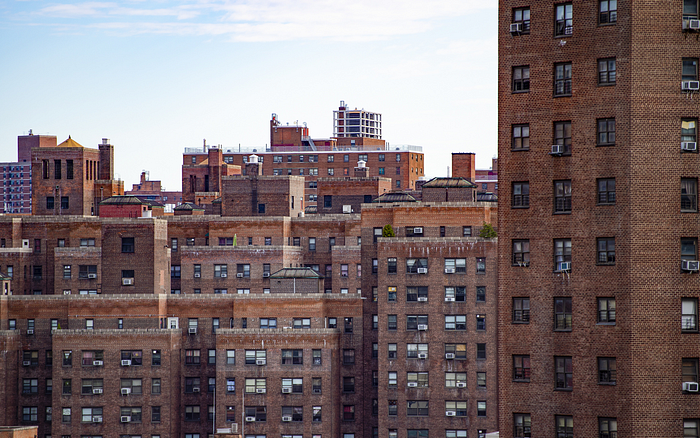New York City’s Housing Crisis
How Robin Hood is Working to Address Housing Insecurity


Following the expiration of New York State’s eviction moratorium on January 15th, New York City is on the brink of a major eviction and homelessness crisis.
Robin Hood and Columbia University’s latest Poverty Tracker report on New York City’s housing crisis shows that a quarter of New York City renters missed at least one rent payment since the beginning of the pandemic. But among New Yorkers who have lost work or income since March 2020, 41% fell behind on rent at least once. Prior reports from the Poverty Tracker have shown that the New Yorkers who lost work or income are disproportionately Black and Latino.
Indeed, while the pandemic has undoubtedly exacerbated financial hardship and housing instability for many New Yorkers, the reality is the city was already unaffordable for many households before COVID-19. Pre-pandemic, more than two in five New Yorkers were rent burdened, meaning they spent at least 30% of their income on rent, and family homelessness was at a record high, a devastating outcome driven by factors such as eviction and the city’s ongoing and persistent affordable housing shortage.
While short-term pandemic-related renter protections and relief dollars have prevented a mass wave of evictions to-date, the ongoing affordability options for low-income renters moving forward are less clear. Without an ongoing, targeted effort to help New Yorkers stay in their homes on the part of government, the private and nonprofit sectors, tens of thousands of households will be newly at-risk of displacement. We should work to avoid this outcome at all costs, as research shows forced moves such as formal and informal evictions, have lasting negative implications, including pushing families into less-resourced neighborhoods, which impacts everything from their safety to access to child care, quality education, and healthy food choices, thereby impacting their opportunities for economic mobility.
The good news is we know what works. Rental subsidies, like the federal Housing Choice Voucher or Section 8 program, are an incredibly effective tool in preventing and ending family homelessness. Unfortunately, the supply of housing subsidies falls far short of the need. That is why Robin Hood was so excited when the federal COVID-19 relief “American Rescue Plan Act” included a substantial increase to housing voucher allocations to states and municipalities. In May 2021, the federal Department of Housing and Urban Development authorized New York City to receive 8,000 emergency housing vouchers. This allocation is five times higher than the number of vouchers typically processed by the city each year.
This influx of housing vouchers is an unprecedented opportunity for New York City to reduce the number of New Yorkers experiencing homelessness or housing instability. It is also a chance for the city to promote economic mobility and reduce housing segregation at-scale.
However, it will not be an easy task for the city to use all 8,000 vouchers, despite the overwhelming need. Voucher utilization depends on an adequate supply of modestly priced rental housing. But in cities like New York, vouchers can be difficult to use given the high cost of housing and low vacancy rates. Robin Hood’s community partners report that it often takes voucher holders months to find housing, and typically, available units are located in areas of concentrated poverty. Even worse, in many cases, would-be renters are unable to find an available apartment. These households are left with no option but to return their voucher, which would have provided them with permanently affordable housing.
Currently, most New York City voucher holders rent from landlords who manage many buildings and housing units. These landlords are known to the city, and there is fierce competition for the units these landlords operate. However, hundreds of thousands of naturally affordable rental units are operated by landlords in smaller buildings, who may not be aware of the new voucher allocation. To unlock a new supply of private-market housing, Robin Hood has funded Enterprise Community Partners to work with community-based organizations who will recruit these small building landlords to rent to these new voucher holders. The city and Enterprise have prioritized the recruitment of landlords in low-poverty, high-opportunity areas. If successful, the program could serve as a blueprint for how the city could administer a vastly expanded federal voucher program, as has been proposed by the Biden Administration and is a key policy priority for Robin Hood.
While Robin Hood prioritizes investments that will expand long-term housing outcomes, we recognize that New Yorkers are at a particularly vulnerable moment now that the eviction moratorium has expired. As such, we have also invested in strategic partnerships that ensure that households access and benefit from all the eviction prevention tools that are available to them.
Specifically, Robin Hood has partnered with trusted partners like CAMBA, Enterprise, the Legal Aid Society, Make the Road, and RiseBoro Community Partnership to launch a Know Your Rights (K.Y.R.) campaign to provide information on COVID-19-related housing rights and protections to undocumented immigrant tenants who are at risk of eviction. Through the effort, households are also made aware of and connected to rent relief funds.
In addition, Robin Hood’s partner JustFix.nyc (JustFix) connects renters to its digital services that help households resolve housing-quality issues, from mold to lack of adequate heat, in order to prevent informal evictions. During the pandemic, JustFix innovated new tools to help renters take the steps needed to be covered by pandemic-related eviction protections.
Traditionally, in New York City, help comes once a household is fighting an eviction in Housing Court or has entered the shelter system. The pandemic has provided us with the opportunity to rethink how our systems work, and it is time that we make sure that public and private efforts align to ensure all low-income renters have access to safe and affordable housing. By doing so, we will spare thousands of households the trauma of eviction and homelessness and strengthen the safety net on which our city depends.
